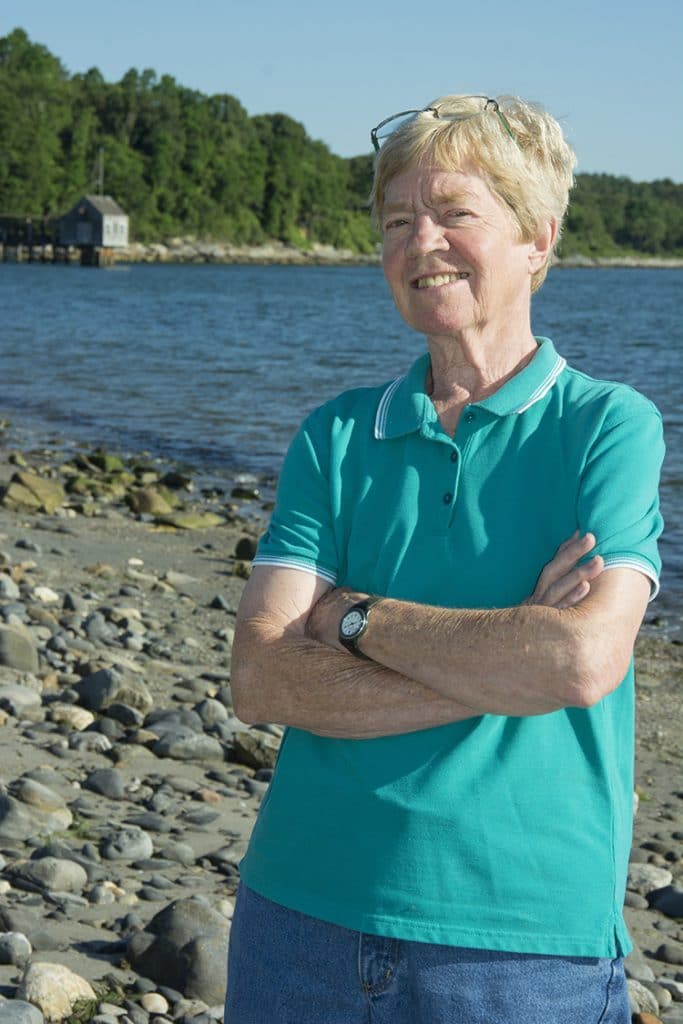Rhode Island Oceanographer, Professor Chosen to Receive Ketchum Award for Coastal Science
August 20, 2015
The Woods Hole Oceanographic Institution (WHOI) has chosen Candace Oviatt, a professor of oceanography at the University of Rhode Island (URI), as the recipient of the 2015 Bostwick H. Ketchum Award.
Administered by the WHOI Coastal Ocean Institute and the members of its advisory committee, the Ketchum Award is bestowed upon a scientist who demonstrates an innovative approach to coastal research, provides leadership in the scientific community, and makes a link between coastal research and societal issues.
The 16th recipient of the award, Oviatt is a well-respected expert in the study of coastal ecosystems whose work spans nearly five decades. With a particular emphasis on Narragansett Bay, her lab studies how metabolism, phytoplankton, and respiration contribute to hypoxia (low oxygen), as well as how pollution in the bay affects estuarine ecosystems.
“Much of the work Candace has done has helped establish a known baseline in Narragansett Bay that has allowed subsequent generations of scientists to examine how the bay has changed with time. Her early work on the composition and abundance of fish in Narragansett Bay has allowed researchers to address changes in these populations through time. Candace’s recent work has been instrumental to our emerging understanding of the impact of a changing climate on Narragansett Bay and other southern New England systems like Massachusetts Bay,” states the nominating letter, which was written by five scientists from a range universities and government research labs.
Her research has also been instrumental in advancing water pollution controls and protective measures for coastal waters in Rhode Island. For example, Oviatt’s work led to actions requiring significant reductions in nutrient loading to upper Narragansett Bay. She received a Lifetime Achievement Award earlier this year from Save the Bay, the local non-profit focused on protecting Narragansett Bay.
In addition to her research, Oviatt serves as the director of the Marine Ecosystems Research Laboratory at URI. She has taught the graduate core course in Biological Oceanography and currently teaches an Oceans and Climate Course on Narragansett Bay.
“Professor Oviatt embodies all of the key qualities we look for in a Ketchum Award recipient. In particular, both the nomination letter and the award committee recognized her excellence in coastal marine ecology, especially her work on Narragansett Bay as a model system for the study of human impacts on temperate estuaries. In an era where eutrophication has become one of the most pressing environmental issues our society faces, her early work was ahead of its time,” said Matt Charette, the director of the Coastal Ocean Institute at WHOI.
Oviatt will officially receive the award—one of the Institution’s highest honors— during a lecture and reception in Woods Hole on October 14, 2015. The award, which includes a bronze medal and an honorarium, was last granted in 2010 to Jim Cloern, a senior research scientist at the U.S. Geological Survey.
“I am deeply honored by the Ketchum Award nomination and thank those responsible for my nomination. I never thought I would receive such prestigious recognition,” Oviatt said. “I look forward to the award ceremony and greeting my friends and colleagues. I am sure it will be quite overwhelming.”
The Ketchum Award was established by WHOI in 1983 in tribute to the late Bostwick H. “Buck” Ketchum, an internationally respected oceanographer. Ketchum was associated with WHOI for 40 years and was a leader in the development of biological oceanography. Buck Ketchum’s pioneering research provided the basis of understanding of productivity of the oceans, and his early work is still cited by scientists in the field.
In later years, Ketchum turned his attention to the effects of human activities on the coastal zone and the need for research into problems in that area. At the time of his death in 1982, he was one of four co-editors of a six-volume series, Wastes in the Oceans, published by John Wiley & Sons. He retired in 1977 as associate director of the Institution.
“Dr. Ketchum was an early oceanographic hero of mine,” Oviatt said. “We looked to him for guidance as we tried to figure out the flushing rate of Narragansett Bay embayments and used his published procedure.”
The Woods Hole Oceanographic Institution is a private, non-profit organization on Cape Cod, Mass., dedicated to marine research, engineering, and higher education. Established in 1930 on a recommendation from the National Academy of Sciences, its primary mission is to understand the ocean and its interaction with the Earth as a whole, and to communicate a basic understanding of the ocean’s role in the changing global environment. For more information, please visit www.whoi.edu.

